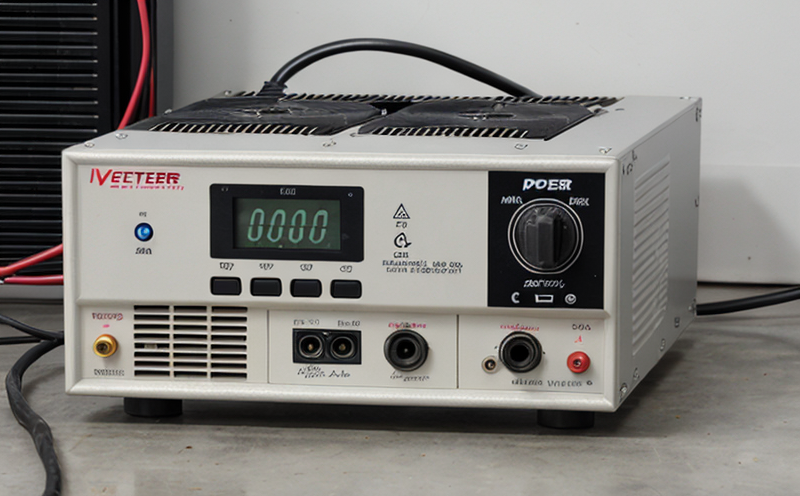EN ISO 12100 Functional Safety Testing of Inverters
The EN ISO 12100 standard provides a framework for ensuring that electrical and mechanical systems are designed to minimize the risk of hazardous events. This standard is particularly critical in renewable energy applications where inverters play a pivotal role in converting direct current (DC) from photovoltaic panels or wind turbines into alternating current (AC) suitable for grid connection.
Inverters are complex electronic devices that require rigorous testing to ensure they meet stringent safety and performance criteria. The functional safety requirements outlined in EN ISO 12100 are essential to prevent malfunctions that could lead to accidents or injuries. This service ensures compliance with these standards, protecting both the operators of renewable energy systems and the public.
The testing process involves multiple stages, including hazard identification, risk assessment, safety requirements definition, system design, and validation. During this phase, we conduct a thorough analysis of potential hazards associated with inverter operation and determine appropriate safety measures to mitigate these risks. This includes identifying fault conditions that could lead to dangerous situations.
Once the safety requirements are defined, the next step is to implement them into the design through appropriate hardware and software modifications. This may involve adding fail-safe mechanisms or redundant systems to enhance reliability. After implementation, comprehensive testing is carried out using various methods such as simulation, environmental stress tests, and accelerated aging tests.
The functional safety testing of inverters focuses on several key areas: fault detection, fault tolerance, fault isolation, and safe failure behavior. Fault detection ensures that any anomalies are recognized promptly; fault tolerance allows the system to continue operating safely despite minor faults; fault isolation minimizes the impact of a fault by containing it within specific boundaries; and safe failure behavior guarantees that in the event of an unrecoverable fault, the system transitions into a safe state.
Testing methodologies include static analysis, dynamic simulation, and physical testing. Static analysis involves reviewing design documents for compliance with safety requirements. Dynamic simulation uses computer models to replicate real-world operating conditions under various scenarios. Physical testing involves subjecting actual units to controlled environments designed to stress their limits. This ensures that the inverters perform reliably even under extreme circumstances.
Compliance with EN ISO 12100 is crucial for ensuring the safety and reliability of renewable energy systems. By adhering to these standards, we help manufacturers produce high-quality products that meet regulatory requirements worldwide. This not only enhances product quality but also builds trust among consumers who rely on safe and dependable energy solutions.
Our team of experienced engineers specializes in performing EN ISO 12100 functional safety testing for inverters. We employ state-of-the-art equipment and software tools to conduct thorough inspections ensuring compliance with all relevant standards. Our services are tailored specifically towards quality managers, compliance officers, R&D engineers, and procurement professionals seeking assurance that their products meet the highest safety standards.
Benefits
- Avoids Non-Compliance Penalties: Ensures adherence to international standards reducing legal risks associated with non-compliance.
- Enhances Product Safety: Identifies and mitigates potential hazards improving overall product safety.
- Boosts Consumer Confidence: Demonstrates commitment to safety fostering trust among customers.
- Promotes Compliance with Regulations: Facilitates smoother interactions with regulatory bodies enhancing market access opportunities.
- Improves Reputation: Establishes a reputation for reliability and quality which can be leveraged in marketing efforts.
Industry Applications
The renewable energy sector heavily relies on inverters to convert power from solar panels or wind turbines into usable electricity. These devices must operate safely and efficiently under diverse environmental conditions, making functional safety testing indispensable.
Inverters used in photovoltaic (PV) systems need to withstand harsh weather conditions like extreme temperatures, humidity, dust, and sand while maintaining optimal performance. Functional safety testing ensures that these inverters can handle such environments without compromising on safety or reliability.
Similarly, wind turbine inverters must be capable of withstanding strong winds, high voltages, and mechanical stresses encountered during operation. They also need to maintain stable output power despite variations in wind speed and direction. Functional safety testing helps guarantee that these inverters meet the necessary performance requirements while minimizing risks.
For hybrid systems combining multiple energy sources like solar and wind, inverters must seamlessly integrate all components ensuring consistent power supply. This integration requires careful design and robust testing to ensure compatibility among different types of equipment. Functional safety testing plays a crucial role in validating these integrations and confirming that the combined system operates safely.
Additionally, battery storage systems rely on inverters for managing stored energy efficiently during periods when renewable sources are unavailable. Inverters must ensure reliable bidirectional power flow between batteries and the grid while maintaining safe operating parameters. Functional safety testing verifies that these inverter functions correctly under all relevant conditions ensuring dependable operation.
Quality and Reliability Assurance
Ensuring consistent quality and reliability is paramount when it comes to renewable energy systems, especially those involving inverters. Functional safety testing plays a vital role in achieving this goal by validating that the equipment meets all specified requirements for safe operation.
We employ rigorous testing protocols based on EN ISO 12100 which cover every aspect of functional safety including fault detection, tolerance, isolation, and behavior during failures. By adhering to these standards, we ensure that inverters perform reliably under various operating conditions enhancing overall system performance and longevity.
Our comprehensive testing approach not only focuses on meeting regulatory requirements but also goes beyond them by incorporating best practices from industry experts. This ensures that our clients receive top-notch services that exceed expectations while maintaining cost-effectiveness throughout the entire process.
Moreover, we provide detailed reports documenting each step of the testing procedure along with results and recommendations for improvement if necessary. These reports serve as valuable resources for continuous improvement efforts within organizations promoting long-term success in their respective fields.





